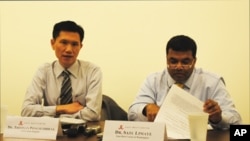A Thai professor of Southeast Asian studies told a group in Washington this week that despite the efforts of Asean to solve a border dispute, no solution is possible without improvements in the Thai political situation.
Indonesia, the acting head of Asean, needs both Cambodia and Thailand to agree to the terms of a potential monitoring mission, which would help ensure a ceasefire along the border that both sides agreed to after deadly violence in February.
However, Thitinan Pongsudhirak, a visiting professor at the Johns Hopkins School of Advanced International Studies, told a group at the East-West Center in Washington that Indonesia’s efforts are constrained by the People Alliance for Democracy, a political group that is unhappy with the way Bangkok has handled the border issue.
“I think that the focus now would be on the polarization in Bangkok,” he said, referring to growing rift between political movements and their divided support of the political figures.
The border has turned into a lightning rod for some groups who want to see more Thai land carved out of disputed areas that Cambodia also claims.
The PAD, which has shifted its support away from the current premier, Abhisit Vejjajiva, is protesting his handling of the border issue as Thai politics ramps toward a national election.
“So before the election, no solution,” Thitinan said. “If no election, then what? Because then it could be a coup.”
Without an election, he said, a national unity government will have to be formed, “but then you have to change the constitution, or suspend of provision to enable this national unity government to be formed outside the constitutional framework.”
The complex political situation in Thailand has hampered efforts by different public officials to reach an agreement on the Thai-Cambodian border, despite efforts by a joint border committee and other officials.
Both sides have had troops amassed along the border since Preah Vihear temple was listed as a World Heritage site under Cambodian administration, in July 2008, sparking nationalistic protests in Bangkok and on the border. Sporadic fighting built to the fiercest clash, in February, which killed at least 10 people and damaged the temple.
Indonesia has since tried to broker a peace arrangement and is hoping to send a monitoring mission of 30 to be divided evenly between the two countries. However, it is unclear whether Thailand is willing to participate in talks, tentatively scheduled next week in Indonesia, which could pave the way for the monitors.
Cambodia has said it will not consider a bilateral solution—something Thailand prefers—and has asked for third-party monitoring.
Thitinan, who is also a professor at the Chulalongkorn University of Thailand, said the mission carries a political risk for Asean, especially if there is no solution to the overall problem or if more fighting continues.
Michael Yahuda, a visiting professor at George Washington University, who attended the discussion, told VOA Khmer afterward that the dispute over the border is historical in nature, not one of political ideology—such as in China or North Korea. The border dispute could therefore have a solution, depending on the internal politics of Thailand.
“I think it’s not something that can be settled very quickly,” he said. “I think it’s something that’s going to carry on for some time, and as long as Thai politics are conflictual and uncertain, the issues won’t go away.”




